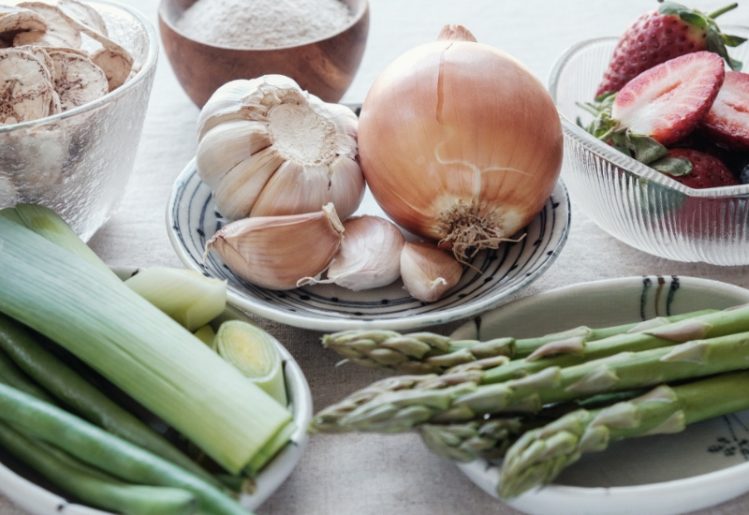Recent research has found that prebiotics promote sleep, suggesting that adding these natural compounds to your diet can help you to get a better night’s sleep.
What Are Prebiotics?
 One of the systems that regulates your overall health is the gut microbiome, which is located in your large intestines and serves as a home to trillions of microbes. While some bacteria can be harmful, the microorganisms in your gut microbiome are helpful, assisting your body by regulating digestion, immune system functioning and dozens of other processes throughout the body. While this system functions on its own, you can help it to work optimally by ensuring it has a broad and diverse community of microbes.
One of the systems that regulates your overall health is the gut microbiome, which is located in your large intestines and serves as a home to trillions of microbes. While some bacteria can be harmful, the microorganisms in your gut microbiome are helpful, assisting your body by regulating digestion, immune system functioning and dozens of other processes throughout the body. While this system functions on its own, you can help it to work optimally by ensuring it has a broad and diverse community of microbes.
This is where prebiotics come into the picture. The microorganisms in your gut microbiome need nourishment to survive, so it’s up to you to eat the right foods that provide this sustenance. The types of foods that feed your gut microbiome contain prebiotics, which help the bacteria in your gut thrive and grow.
Prebiotics are found in the fiber of plant-based foods, which is just one reason eating fruits and vegetables is important to your health. This type of fiber isn’t digested easily, which means it can be passed through your digestive system and into your gut. Once the fiber makes it to your large intestine, the bacteria in the gut microbiome feed on it to get essential nourishment.
It’s more common to hear about probiotics in the media, but probiotics are not the same as prebiotics. While prebiotics help the bacteria in your gut to grow, probiotics introduce new microorganisms into your gut microbiome. This is also important to the health of your gut, but it should be understood that probiotics perform a different function. Additionally, recent research has found that prebiotics may perform other roles in maintaining health.
How Do Prebiotics Promote Sleep?
In order to understand how prebiotics promote sleep and reduce stress, it’s important to understand the connection between the gut microbiome and the brain. These two areas of the body interact in three known ways by affecting how cells in other parts of the body are regulated. For instance, both the brain and the bacteria in the gut affect the immune system’s cells, and this allows these two systems to interact with one another as well.
The brain and gut also share an endocrine system pathway, where they can exchange hormones. This helps hormones, such as dopamine, serotonin, melatonin and cortisol, cross the blood-brain barrier. Finally, the vagus nerve acts as a superhighway that provides direct access between the brain and the gut. This enables the gut to directly influence brain activities, including regulating the release of neurotransmitters that affect sleep patterns.
A study conducted at the University of Colorado in Boulder focused on the link between prebiotics and sleep. The researchers used two groups of male rats, feeding the first group a diet heavy in prebiotic foods. The second group was deprived of prebiotics, but fed a regular diet. During the five-week study, all of the rats were exposed to stimuli intended to produce high stress levels. The researchers found that the rats receiving the prebiotic diet experienced lower stress levels and slept more deeply. They confirmed that the prebiotic-fed rats spent more time in REM sleep, which is vital to mental health.
The researchers found that these benefits were the result of changes to metabolites in the gut, which are a specific type of microbial life. By altering the development of metabolites, prebiotics help them to influence the brain’s response to stress. This process also helps promote more frequent REM sleep.
Ways to Add More Prebiotics to Your Diet
 Essentially, prebiotics work together with probiotics to ensure your gut microbiome is as diverse as possible. If you think you may not be getting enough prebiotics and probiotics in your diet, taking a high-quality supplement that’s engineered to provide both prebiotics and probiotics can help. Adding the following foods to your diet will also help keep your gut healthy and the microbiome diverse.
Essentially, prebiotics work together with probiotics to ensure your gut microbiome is as diverse as possible. If you think you may not be getting enough prebiotics and probiotics in your diet, taking a high-quality supplement that’s engineered to provide both prebiotics and probiotics can help. Adding the following foods to your diet will also help keep your gut healthy and the microbiome diverse.
Garlic
The sweet flavor of garlic is the result of a prebiotic called fructooligosaccharides (FOS). About 6 percent of each garlic clove’s fiber is comprised of FOS. Garlic also has antioxidant properties, helping to fight against cancer and other degenerative conditions.
Onions
Garlic and onions belong to the same family, and they contain the same measure of FOS. The prebiotics in onions are also helpful in breaking down fat in the gut, so they may assist with weight loss. Onions help the body produce more nitric oxide, which aids in strengthening the immune system.
Asparagus
As a great source of fiber, asparagus is also an excellent source of prebiotics. Additionally, asparagus has anti-inflammatory and antioxidant properties, making it a helpful food in protecting cellular health and improving heart health.
Bananas
Providing a high content of starch as well as fiber, bananas are a great source of prebiotics. In addition to helping you maintain a healthy gut microbiome, bananas have been shown to be helpful in lowering abdominal bloating.
Oats
Adding more oats to your diet will help you boost the prebiotics in your gut as a result of the large beta-glucan fiber content in each serving. In addition to helping you maintain a thriving gut microbiome, oats will help you lower your LDL (bad) cholesterol, and help to regulate your blood sugar levels.
Apples
Finally, apples are another excellent source of prebiotics. In this case, the pectin in apples, which makes up more than half of the fruit’s fiber, provide the gut with a substantial supply of prebiotics. The polyphenol antioxidants in apples also help protect against cancer, and help to reduce LDL cholesterol.


